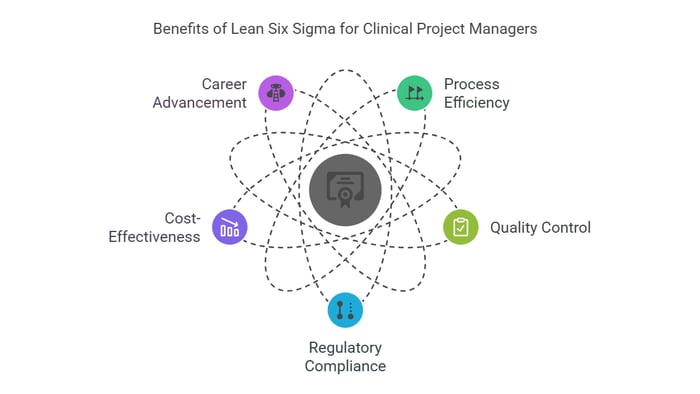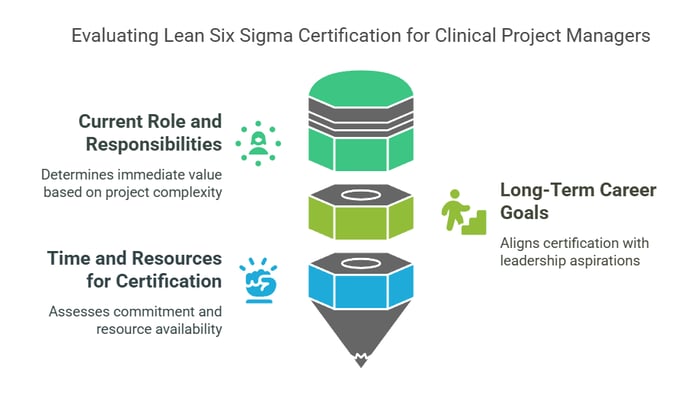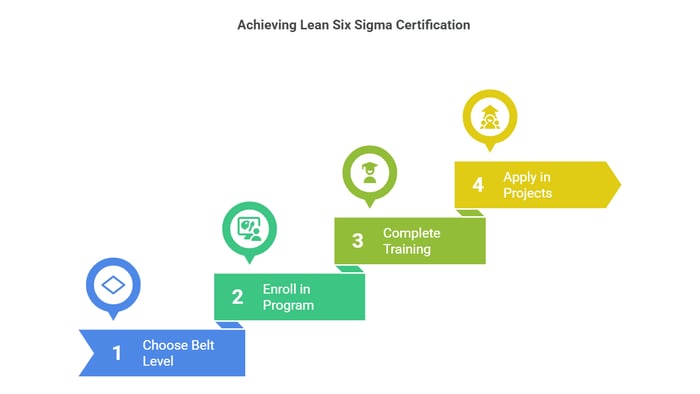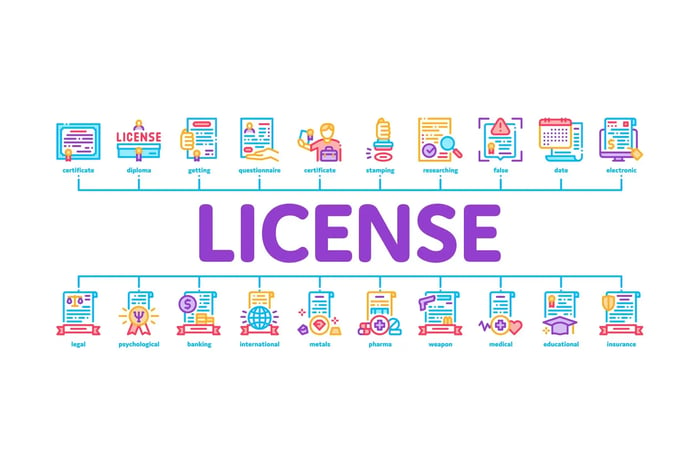Table of Contents
- What is Lean Six Sigma Certification?📚
- Why Should Clinical Project Managers Take Lean Six Sigma Certification?💡
- Is Lean Six Sigma Certification Right for Clinical Project Managers?🤷♀️
- How to Obtain Lean Six Sigma Certification?📝
- Benefits of Lean Six Sigma Certification for CPMs 🌟
- 10 Lesser-Known Facts on Should Clinical Project Managers Take Lean Six Sigma Certification
- Final Thoughts
- FAQs
In the fast-evolving world of clinical project management, maintaining efficiency and delivering quality outcomes are paramount. Clinical Project Managers (CPMs) face numerous challenges, including meeting deadlines, ensuring patient safety, and managing budgets while adhering to strict regulations. One way to enhance their skill set and improve overall project outcomes is by pursuing Lean Six Sigma certification. In this blog, we’ll explore should clinical project managers take Lean Six Sigma certification, how it can benefit them, and whether it's a worthy investment for professionals in the clinical field.

What is Lean Six Sigma Certification?📚
Before delving into whether clinical project managers should pursue Lean Six Sigma certification, it's important to understand what Lean Six Sigma is.
Lean Six Sigma is a methodology that combines two powerful approaches:
Lean: Aims to eliminate waste and improve process efficiency.
Six Sigma: Focuses on reducing variability and defects in processes.
Together, these methodologies aim to optimize business processes, ensuring that organizations can deliver high-quality outcomes in the most efficient manner possible. Lean Six Sigma certification typically comes in various levels, including Yellow Belt, Green Belt, Black Belt, and Master Black Belt, each offering a progressively deeper understanding of the principles and tools used in process improvement.
Why Should Clinical Project Managers Take Lean Six Sigma Certification?💡

1. Enhance Process Efficiency⚡
One of the primary reasons for why should Clinical Project Managers take Lean Six Sigma certification is its ability to enhance process efficiency. Lean Six Sigma's tools, such as DMAIC (Define, Measure, Analyze, Improve, Control), can be applied to clinical trials to streamline processes, reduce inefficiencies, and minimize bottlenecks.
Clinical projects often involve multiple stakeholders, including patients, investigators, sponsors, and regulatory bodies. By implementing Lean Six Sigma principles, CPMs can improve workflow and ensure that each phase of the project progresses smoothly and on time. Reducing inefficiencies can also lead to faster trial completion and better utilization of resources.
2. Improve Quality Control✅
Clinical trials are heavily regulated, and ensuring quality control is a critical aspect of project management. Lean Six Sigma provides CPMs with tools to identify and eliminate sources of defects in the clinical trial process. This could range from errors in data collection to deviations in adherence to trial protocols.
By using Six Sigma tools like Control Charts and Process Mapping, clinical project managers can track performance metrics and identify areas where errors might occur, enabling them to implement corrective actions. This leads to higher quality outcomes and reduces the likelihood of costly mistakes that could delay the trial or harm patient safety.🎯
3. Meet Regulatory and Compliance Standards🏛️
Clinical trials must comply with stringent regulatory standards set by health authorities such as the FDA, EMA, or ICH. Lean Six Sigma certification can help clinical project managers align their projects with these standards more effectively. The methodologies instill a culture of continuous improvement, where regulatory compliance becomes a fundamental part of the project.
By applying Lean Six Sigma tools to monitor adherence to guidelines, CPMs can minimize compliance issues that might arise during clinical trials. This leads to a smoother approval process and mitigates the risk of regulatory penalties.
4. Improve Cost-Effectiveness💰
Clinical trials can be costly, and any inefficiencies in managing resources can drive up costs. Lean Six Sigma principles focus on eliminating waste and optimizing resource utilization, both of which can lead to significant cost savings.
Clinical project managers can apply Lean Six Sigma techniques to minimize the resources used in various stages of a clinical trial while still maintaining the required quality and regulatory standards. This can result in reduced operational costs, which is beneficial for both the sponsor and the organization conducting the trial.
5. Boost Career Prospects🚀
For clinical project managers looking to advance their careers, Lean Six Sigma certification can serve as a valuable credential. It demonstrates a commitment to process improvement and quality management, both of which are essential in the clinical project management field.
A Lean Six Sigma certification, especially at the Green Belt or Black Belt level, can set a CPM apart from others in the field and open up opportunities for higher-paying roles or leadership positions within organizations. It also showcases that the individual has a strong understanding of advanced project management methodologies, which is highly regarded in the industry.
If you're interested in comparing Lean Six Sigma with other project management certifications, check out this comprehensive guide on PMP vs Six Sigma.
Is Lean Six Sigma Certification Right for Clinical Project Managers?🤷♀️
While Lean Six Sigma offers numerous benefits, it's important to evaluate whether the certification is the right fit for your career goals and project management approach.

1. Current Role and Responsibilities
If you’re a clinical project manager working on large-scale, complex clinical trials or clinical research projects, Lean Six Sigma can provide you with the tools to manage these projects more efficiently. However, if your responsibilities are more focused on administrative tasks or routine project oversight, the certification may not provide immediate value.
2. Long-Term Career Goals
For CPMs looking to move into senior management or leadership roles, Lean Six Sigma can serve as a useful stepping stone. As clinical trials become more complex, organizations are looking for project managers who can improve processes and reduce costs. Lean Six Sigma certification helps demonstrate these abilities.
3. Time and Resources for Certification
While Lean Six Sigma certification can significantly enhance a CPM’s skills, it requires a commitment of time and effort. The Green Belt and Black Belt certifications often require a substantial investment in terms of training, coursework, and real-world project implementation. Consider whether you have the time and resources to pursue this certification.
How to Obtain Lean Six Sigma Certification?📝
Obtaining Lean Six Sigma certification is a multi-step process:

Choose Your Belt Level: Determine whether you want to pursue Yellow Belt, Green Belt, Black Belt, or Master Black Belt certification, depending on your experience level and career goals.
Enroll in a Certification Program: Numerous organizations offer Lean Six Sigma training and certification, including accredited universities, online courses, and professional organizations.
Complete Training and Exams: Depending on the level of certification, you will need to complete a certain amount of coursework and pass exams to demonstrate your knowledge.
Apply Lean Six Sigma in Real Projects: To attain Green Belt and Black Belt certifications, you’ll need to demonstrate your ability to apply Lean Six Sigma tools to real-world projects, such as clinical trials.
Bonus Read: To dive deeper into Six Sigma and how it can benefit your project management skills, explore our article on Mastering Project Management.
Benefits of Lean Six Sigma Certification for CPMs 🌟
| Benefit | Description |
|---|---|
| Increased Efficiency | Eliminate waste and bottlenecks in clinical trials, speeding up timelines. |
| Higher Quality Control | Ensure strict adherence to protocols and reduce errors in the clinical trial process. |
| Cost Reduction | Optimize resource allocation and reduce unnecessary expenditures. |
| Career Advancement | Set yourself apart as a leader capable of driving improvements and optimizing processes. |
10 Lesser-Known Facts on Should Clinical Project Managers Take Lean Six Sigma Certification
1. Six Sigma’s Origin in Motorola
The Six Sigma methodology was developed by Motorola in the 1980s as a way to improve product quality and process efficiency. It gained popularity in the 1990s when it was adopted by major companies such as General Electric (GE).
2. Six Sigma's Statistical Basis
Six Sigma is based on a statistical concept where the goal is to reduce defects to less than 3.4 per million opportunities. This represents a high level of process perfection and minimal variation.
3. Lean Six Sigma Reduces Trial Delays
A study from the Journal of Clinical Research Best Practices found that applying Lean Six Sigma tools to clinical trials can significantly reduce delays in recruitment, data collection, and regulatory approvals.
Source: Journal of Clinical Research Best Practices
4. Green Belt Certifications are Becoming More Popular
In recent years, the Green Belt certification has seen a surge in popularity in clinical project management, with over 70% of project managers in healthcare reporting that they have pursued this certification.
Source: Healthcare Financial Management Association
5. Improving Clinical Trial Data Integrity
Lean Six Sigma’s tools like Process Mapping and Fishbone Diagrams are being increasingly used in clinical trials to ensure the integrity and consistency of data across multiple research sites, ultimately increasing the reliability of the results.
Source: NIH National Library of Medicine
6. Cost Savings in Clinical Trials
Lean Six Sigma methodologies can reduce clinical trial costs by up to 40% by eliminating waste in processes like patient enrollment, study initiation, and trial monitoring.
Source: Center for Drug Evaluation and Research (FDA)
7. Six Sigma and FDA Compliance
Six Sigma methodologies align well with FDA Good Clinical Practice (GCP) guidelines, as both emphasize quality management, regulatory compliance, and process improvement.
Source: FDA
8. Increased Patient Safety Through Process Control
By applying Six Sigma tools like Failure Mode and Effects Analysis (FMEA), clinical project managers can proactively identify risks to patient safety in clinical trials and implement corrective actions before any adverse events occur.
9. Six Sigma’s Impact on Regulatory Approval Times
Clinical trials that employ Six Sigma tools for process improvement have shown a 20-30% reduction in regulatory approval times. This can be attributed to improved documentation and streamlined processes.
Source: Regulatory Affairs Professionals Society (RAPS)
10. Global Adoption in Healthcare
While Lean Six Sigma started in manufacturing, it is now widely adopted across the healthcare industry. In fact, over 50% of hospitals in the U.S. use some form of Lean or Six Sigma methodology to improve patient care and operational efficiency.
Source: Institute for Healthcare Improvement
Final Thoughts
In conclusion, clinical project managers should consider taking Lean Six Sigma certification to enhance their ability to manage projects efficiently, improve quality control, and reduce costs. Lean Six Sigma can be a game-changer in the clinical trial industry, helping CPMs deliver high-quality outcomes while minimizing waste and errors.
If you’re committed to advancing your career and improving project outcomes, Lean Six Sigma certification is a valuable investment that can help you stand out in a competitive field. By incorporating the principles of Lean Six Sigma into your daily practices, you can achieve better results for both your team and your organization.
Ready to take your project management skills to the next level? Explore the range of certifications offered by APMIC to enhance your career and stand out in the field of clinical project management.
FAQs
What is Lean Six Sigma certification?
Lean Six Sigma certification focuses on improving processes by reducing waste and defects. It combines Lean (efficiency) and Six Sigma (quality control) methodologies to optimize business workflows.
How does Lean Six Sigma benefit clinical project managers?
Lean Six Sigma helps clinical project managers streamline processes, improve quality control, reduce costs, and ensure regulatory compliance, leading to more efficient and successful clinical trials.
What are the levels of Lean Six Sigma certification?
The main levels are Yellow Belt (beginner), Green Belt (intermediate), Black Belt (advanced), and Master Black Belt (expert), each offering deeper knowledge and more responsibility.
Is Lean Six Sigma certification worth it for clinical project managers?
Yes, it can significantly enhance efficiency, reduce costs, improve quality control, and boost career opportunities, making it a valuable investment for CPMs.
How long does it take to earn a Lean Six Sigma certification?
Yellow Belt takes a few days to a week, Green Belt takes about 3-6 months, and Black Belt can take 6 months to a year, depending on the level of certification and time commitment.
Can Lean Six Sigma be applied to clinical trials?
Absolutely! Lean Six Sigma is highly effective in clinical trials, improving processes like patient recruitment, data management, and protocol adherence.
What is the difference between Lean Six Sigma Green Belt and Black Belt?
Green Belt is for professionals who manage projects and apply Lean Six Sigma tools part-time, while Black Belt professionals lead projects and mentor others in using Lean Six Sigma techniques.
How can Lean Six Sigma help with regulatory compliance in clinical trials?
Lean Six Sigma helps ensure that clinical trial processes are consistently aligned with regulatory standards, reducing errors and improving adherence to guidelines, which lowers the risk of compliance violations.





